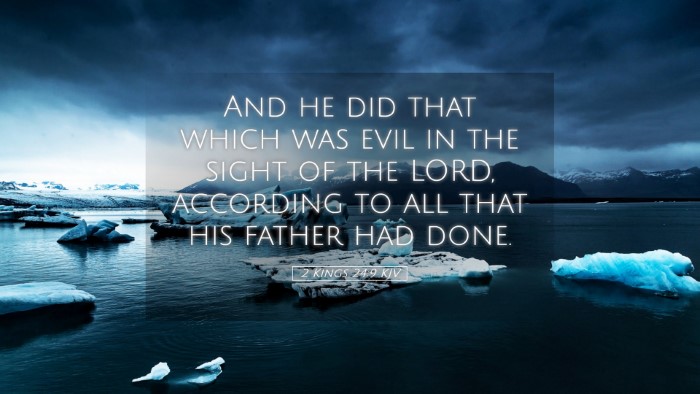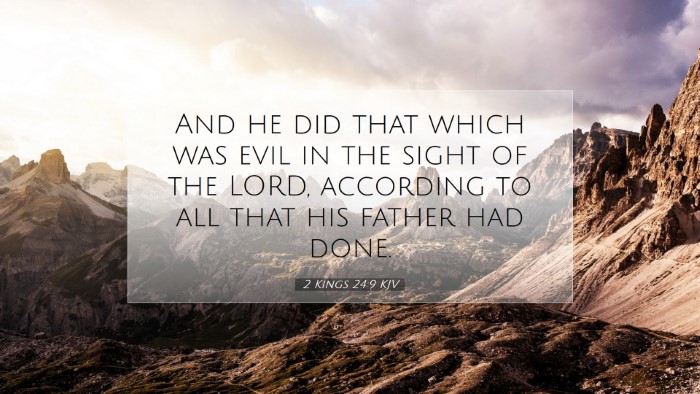Old Testament
Genesis Exodus Leviticus Numbers Deuteronomy Joshua Judges Ruth 1 Samuel 2 Samuel 1 Kings 2 Kings 1 Chronicles 2 Chronicles Ezra Nehemiah Esther Job Psalms Proverbs Ecclesiastes Song of Solomon Isaiah Jeremiah Lamentations Ezekiel Daniel Hosea Joel Amos Obadiah Jonah Micah Nahum Habakkuk Zephaniah Haggai Zechariah Malachi2 Kings 24:9
2 Kings 24:9 KJV
And he did that which was evil in the sight of the LORD, according to all that his father had done.
2 Kings 24:9 Bible Commentary
Commentary on 2 Kings 24:9
Verse: "And he did that which was evil in the sight of the Lord, according to all that his father had done."
Introduction
The context of 2 Kings 24:9 reveals a critical period in the history of Judah. This verse highlights the behavior of King Jehoiachin, who ascended to the throne at a particularly tumultuous time. It serves to illustrate the broader narrative of Judah's decline and God's judgment upon his people. Insights into this passage can be derived from various public domain commentaries.
Historical Context
Jehoiachin, also known as Jeconiah, was the son of King Jehoiakim. His reign lasted only three months but marked a decisive moment leading to the Babylonian exile. This reference to his wickedness reflects the overarching themes of disobedience and unfaithfulness that characterized the kings of Judah during this era.
Matthew Henry's Commentary
Matthew Henry emphasizes the spiritual decline of Judah as a nation. He notes that Jehoiachin's evil actions were not isolated but rather symptomatic of a pervasive corruption stemming from his father's example. Henry points out the dangerous precedent set by Jehoiakim, advocating that a ruler's conduct significantly influences the moral direction of a nation. He underscores that Jehoiachin's short reign epitomizes the inevitable consequences of forsaking God's commandments.
Albert Barnes' Commentary
Albert Barnes discusses the depth of Jehoiachin's moral failure by comparing him to previous kings of Judah. Barnes indicates that Jehoiachin "did evil in the sight of the Lord" as a definitive characterization, suggesting that his actions did not escape divine scrutiny. He further elaborates that this verse serves as a divine indictment of both Jehoiachin and the collective rebellion of Judah against God's statutes. Barnes highlights the spiritual blindness that often accompanies such disregard for God’s will and cautions readers about the serious implications of leading others astray.
Adam Clarke's Commentary
Adam Clarke provides an insightful examination of the Hebrew text, discussing the phrase "in the sight of the Lord." He interprets it as signaling not only God's awareness but also His judgment upon Jehoiachin's actions. Clarke elaborates that such a statement reflects the seriousness of God’s perspective; thus, the king's wickedness becomes a focal point for understanding divine justice. Clarke connects the verse to God's covenant with Israel, suggesting that the kings’ failure represents a breach of that covenant, drawing God’s ire and leading to inevitable punishment.
Thematic Implications
- The Influence of Leadership: The commentary from Henry, Barnes, and Clarke collectively illustrates the profound impact of a ruler's behavior on the spiritual health of a nation. Jehoiachin, merely following the steps of his father, demonstrates how the legacy of sin can perpetuate itself through generations.
- Divine Judgment: Each commentator emphasizes the reality of God's judgment in understanding this verse. The mention of doing "evil in the sight of the Lord" serves as a solemn reminder that all actions have consequences, especially those of leaders.
- Moral Decline: The gradual moral decay in Judah is evident through this passage. The failure to uphold righteousness invites chaos and destruction, affirming the biblical principle that nations are held accountable for their leaders’ decisions.
- Hope of Restoration: Though the immediate context is grim, these commentaries also invite reflection on the broader narrative of redemption present throughout Scripture. Even in judgment, God’s ultimate plan for restoration is a theme that resonates through the prophetic writings and culminates in the New Testament.
Conclusion
The verse 2 Kings 24:9 stands as a potent reminder of the grave responsibilities borne by leaders in spiritual contexts. Through the insights provided by Matthew Henry, Albert Barnes, and Adam Clarke, contemporary readers are called to reflect on the importance of following God's ways, recognizing the impact they can have on future generations. The narrative showcases not merely the historical failures of Judah, but also the need for repentance and faithfulness in the pursuit of divine grace.


